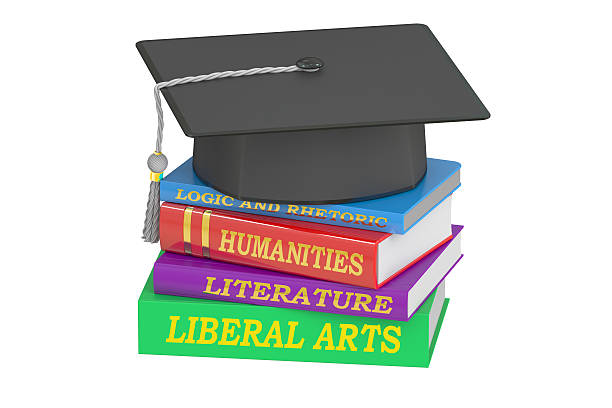The liberal arts and humanities degrees are one of the oldest and most fundamental in higher education, focusing on areas like arithmetic, the natural and social sciences, history, art, and other humanities.
Liberal arts degrees can prepare future graduates for various occupations and sectors by giving students a flexible foundation.
Although the terms “humanities degrees” and “liberal arts degrees” are frequently used interchangeably, there are important distinctions between the two and the doors that each offers to graduates.
Degree programs in the liberal arts and humanities, some of the most flexible options accessible to students, can give students the knowledge and abilities they need to achieve their goals, find fulfilling employment, and develop into lifelong learners.
In this article, we have compiled everything you need to know about liberal arts and humanities and their differences and similarities.
Table of contents
- What Is a Liberal Arts Degree?
- What Is a Liberal Arts College?
- Should You Get a Liberal Arts Degree?
- What Is “Humanities” Exactly?
- What Are the Most Popular Humanities Majors?
- What are The 5 Essential Skills Gained From Humanities Courses?
- What is The Professional Value of a Humanities Degree?
- Humanities vs. Liberal Arts: Similarities and Differences
- Frequently Asked Questions
- Conclusion
- References
Read this: Which are Better: Honors Vs AP Classes In High School? | Best Guides
What Is a Liberal Arts Degree?
A lot of people frequently conflated the humanities and liberal arts. Still, a liberal arts degree is a general phrase encompassing degrees in the arts, social sciences, natural sciences, and the humanities.
Humanities liberal arts degrees include subjects like English, history, philosophy, communications, and foreign languages, whereas arts majors can choose to study things like music, design, theater, and painting.
Some universities even provide a liberal arts major that allows students to pursue multidisciplinary studies.
Majors in the social sciences that fall within the liberal arts category include anthropology, psychology, sociology, economics, and political science.
Another option for a liberal arts degree in the natural sciences is to major in biology, environmental science, mathematics, chemistry, or physics.
Numerous universities award liberal arts degrees through the College of Arts and Sciences. Liberal arts are also the foundation of the bulk of general education standards, which promote the idea of thorough instruction in multiple subjects.
Even some colleges offer a liberal arts major that enables students to conduct interdisciplinary research.
In the end, a liberal arts education helps students develop their communication skills and critical thinking skills.
According to Princeton’s Office of Admission, “[liberal arts majors] will learn to read critically, write cogently, and think broadly by exploring issues, ideas, and methods across the humanities and the arts, as well as the natural and social sciences.”
What Is a Liberal Arts College?
Even though many colleges and universities grant degrees in the liberal arts, a liberal arts college offers a full liberal arts curriculum. These universities often emphasize small class sizes and a curriculum that prioritizes the humanities, arts, social sciences, and natural sciences.
Similar to those pursuing a liberal arts degree at a research university, liberal arts institutions need students to fulfill general education requirements that place a strong emphasis on the talents of critical thinking, problem-solving, and reasoning.
Maine’s Bowdoin College states, “A modern liberal arts education takes whatever you’re passionate about — history, medicine, music, law, neuroscience, engineering, poetry, teaching, biology — and helps you understand how it will impact the world around you.”
Furthermore, the College of Liberal Arts views education as more than merely a means of obtaining a profession. The president of Occidental College, Jonathan Veitch, stated: “A liberal arts college takes seriously the notion that a job isn’t a job, it’s a vocation, so it better bring meaning to your life and help you think through what that might look like.”
Also, read this: 10 Best TVs for Your College Dorm Room (May 2024)
Should You Get a Liberal Arts Degree?
The value of a liberal arts education to you will depend on your interests, abilities, and career choice. You can decide whether to obtain a liberal arts degree using the following motivations.
- To improve your soft skills. Some of the most in-demand talents, such as critical thinking and creative problem-solving, are taught in a liberal arts degree.
- You enjoy talking to others and are skilled at doing so. A liberal arts degree can be the best option if you have a strong interest in writing, public speaking, or helping others.
- After graduation, you’d love to have a variety of professional alternatives. The opportunity to use the abilities you get from a liberal arts degree in various industries and vocations is arguably one of the largest advantages. A liberal arts education might help you establish and ultimately accomplish your goals if you are unsure of the type of work you desire or are interested in several career choices.
- Also, you don’t mind immediately earning less money. Although many liberal arts majors start with modest salaries, increasing pay later, it’s not hard. You can make your liberal arts degree worthwhile if you put in the effort.
What Is “Humanities” Exactly?
The study of the human world and society critically is a component of the humanities. Popular majors in this area include English, history, and philosophy.
Students in these fields explore humanity itself (thus the name), using analytical techniques to comprehend history, literature, art, human morality, culture, values, and morality.
Every humanities discipline uses a different set of interpretation techniques. The historical method, which has subfields like cultural history, quantitative history, and oral history, is what historians employ.
While philosophy employs conceptual analysis and experimental methods, English and other languages use textual criticism to interpret sources.
What Are the Most Popular Humanities Majors?
Well, over 100,000 students graduate each year with a bachelor’s degree in the humanities.
English, history, religious studies, philosophy, and art history are common humanities majors.
The National Center for Education Statistics reports that more than 40,000 students majoring in English language and literature received their degrees in 2018.
Under 10,000 students graduated with degrees in philosophy and religious studies within the same academic year, and 17,000 students declared a major in a foreign language. Another 44,000 majors were in humanities and general liberal arts.
Furthermore, the popularity of each major is ranked by the Center on Education and the Workforce at Georgetown University.
Humanities and the liberal arts are college students’ third most popular fields of specialization, behind business and education.
You can check this: Good Guys vs Bad Guys Unblocked for College Students in 2024
What are The 5 Essential Skills Gained From Humanities Courses?
More than only William Shakespeare’s plays and the French Revolution are covered in humanities courses. Courses in the humanities help students develop important abilities including effective communication, teamwork, and information interpretation.
It has been demonstrated that the following transferrable abilities will help humanities majors get employment:
Writing Skills
Humanities majors write many essays, which teaches them how to develop arguments based on evidence, interact with readers coherently, and write persuasively.
Students who are writing research papers must carefully assess the data and convey it clearly and succinctly.
Research Abilities
Writing and research go hand in hand. Students in the humanities are taught to recognize pertinent material, evaluate sources, and extract relevant data from their research.
Also, they must provide logical and convincing findings. The range of sources students use includes primary sources, analytical texts, surveys, and visuals.
Analysis
While English and foreign language majors investigate grammatical structures and rhetorical devices, literature, and history majors scrutinize texts. Since they must evaluate sources critically and construct logical arguments based on their analyses, students who major in the humanities might strengthen their analytical abilities.
Furthermore, critical analysis in the humanities largely uses qualitative materials, whereas the social sciences and natural sciences rely more on quantitative sources.
Creativity
Humanities courses encourage creativity by preparing students to think critically, nuancedly, and without preconceptions.
Professionals in various sectors, like business and STEM, which highly emphasize creative problem-solving, might benefit from offering novel solutions or developing new methods of presenting ideas.
Check this: Charter Schools VS Public Schools: Differences, Similarities in 2024
Critical Thinking
The humanities are renowned for emphasizing the development of critical thinking abilities. They teach students to approach knowledge with a critical eye through coursework that requires them to synthesize and analyze information from various sources. Additionally, they learn how to recognize bias and use logic.
What is The Professional Value of a Humanities Degree?
Georgetown University research reveals that people with humanities degrees make about $29,000 annually at the beginning of their careers, or significantly less than the $33,000 median pay for all undergraduate majors.
With five or more years of job experience under their belts, graduates with humanities majors can earn $52,000 on average.
These salaries may seem cheap when compared to other majors, however, they are not fixed.
Getting a graduate degree is one method humanities majors might boost their earning potential. More than 40% of students studying humanities today attend graduate school.
According to the American Academy of Arts and Sciences, a graduate degree in any subject can boost a humanities major’s annual income by as much as $20,000.
Humanities vs. Liberal Arts: Similarities and Differences
They frequently discussed the humanities and liberal arts about one another, and sometimes overlap. However, the two can have very distinct foci.
So, the fact that they regard the humanities as a subset of the liberal arts, even though they are both different disciplines with distinct educational goals, may perplex people studying humanities vs. liberal arts degrees.
Education and Training
In contrast to the humanities, which are commonly studied in BA degrees, liberal arts is the larger discipline and can be studied in either a Bachelor of Arts (BA) or a Bachelor of Science (BS) program.
This divide refers to the teaching methods and skills students acquire, with science degrees relying on practical and analytical methods. In contrast, arts degrees tend to be more theoretical and emphasize the component of human behavior.
Related post: Psychology and Sociology Majors: What’s the Difference & Similarities?
Skills
In addition to giving students a chance to explore topics that interest them, bachelor’s degree programs in the humanities and liberal arts also transmit useful and transferable skills that may be applied in a variety of professional and academic settings. Among these abilities are:
- Critical thinking and analysis: A fundamental element of nearly any work is the ability to conduct an unbiased assessment and offer the best feasible solution based on the information at hand.
- Effective communication with clients and team members is essential in many professions, and it can be the difference between failure and success.
- Empathy and compassion: Graduates in humanities and liberal arts may lead effectively and develop great relationships with their teams by having a deeper grasp of human behavior.
- Time management and organization are necessary for obtaining a higher education degree, and these abilities are easily transferable to the business.
Career Path
Graduates in the humanities and liberal arts have a broad knowledge of many subjects, and their choice of concentration after earning their bachelor’s degree might determine career success.
Due to their capacity to think critically and creatively while fusing “out of the box” concepts with methodical analysis, many organizations favor graduates from both fields. Skilled graduates have access to a wide range of professional choices, including:
- Archaeologist: Archaeologists research how human behavior and cultures first emerged.
- Writer/Copywriter: Qualified writers produce material for companies in various industries.
- Social workers help people deal with problems and issues related to money, behavior, or emotions. They can help people access community resources or arrange child care.
- Experts in human behavior, psychologists assist patients in managing stress or mental health issues through clinical work or study.
- Administrators and human resources specialists are crucial to the smooth operation of many firms since they oversee the personnel and support everyday operations.
- Training and development professionals assist in educating employees and enhancing their abilities, which is related to human resources management.
- Experts in their profession who work in a range of industries, management consultants help businesses achieve their financial or company growth objectives.
- Researcher: Researchers look for and analyze data, test new hypotheses, and operate in various subjects and sectors.
More so, Humanities and liberal arts graduates can assist corporations in achieving their objectives by utilizing their understanding of human behavior, capitalizing on their client’s requirements, and seeking to have a good impact on a firm’s future.
Related post: Can You Apply For Early Action/Early Decision Multiple Times | 2024?
Frequently Asked Questions
The history and evolution of human intellect and culture are studied in the humanities. Humanities courses aim to provide students with a comprehensive and linked understanding of the human experience by emphasizing literature, history, philosophy, art, and film.
Law, languages, philosophy, religion and mythology, international relations, gender and women’s studies, multicultural and regional studies, popular culture, and art and music are examples of humanities branches, while sociology, anthropology, archeology, and geography are examples of social sciences.
Grammar, Rhetoric, Logic, Music, Geometry, Arithmetic, and Astronomy are the liberal arts listed from left to right, each with an inscription and an attribute.
Studying history, literature, writing, philosophy, sociology, psychology, creative arts, and other subjects is part of a liberal arts education. The goal of a liberal arts education is to improve your ability to think critically, communicate clearly, and solve issues.
Conclusion
Our capacity for creation is one of the many things that distinguishes the human experience. The knowledge `available to inquiring and enthusiastic students is limitless, regardless of whether they want to pursue a degree in the humanities or the liberal arts.
Students can develop meaningful relationships and a rewarding profession by learning ways of understanding one another and the world around us.
For those who want to develop practical skills for their career, earning a broad-based liberal arts degree like the online Bachelor of Science in Liberal Studies can be a great starting point.





